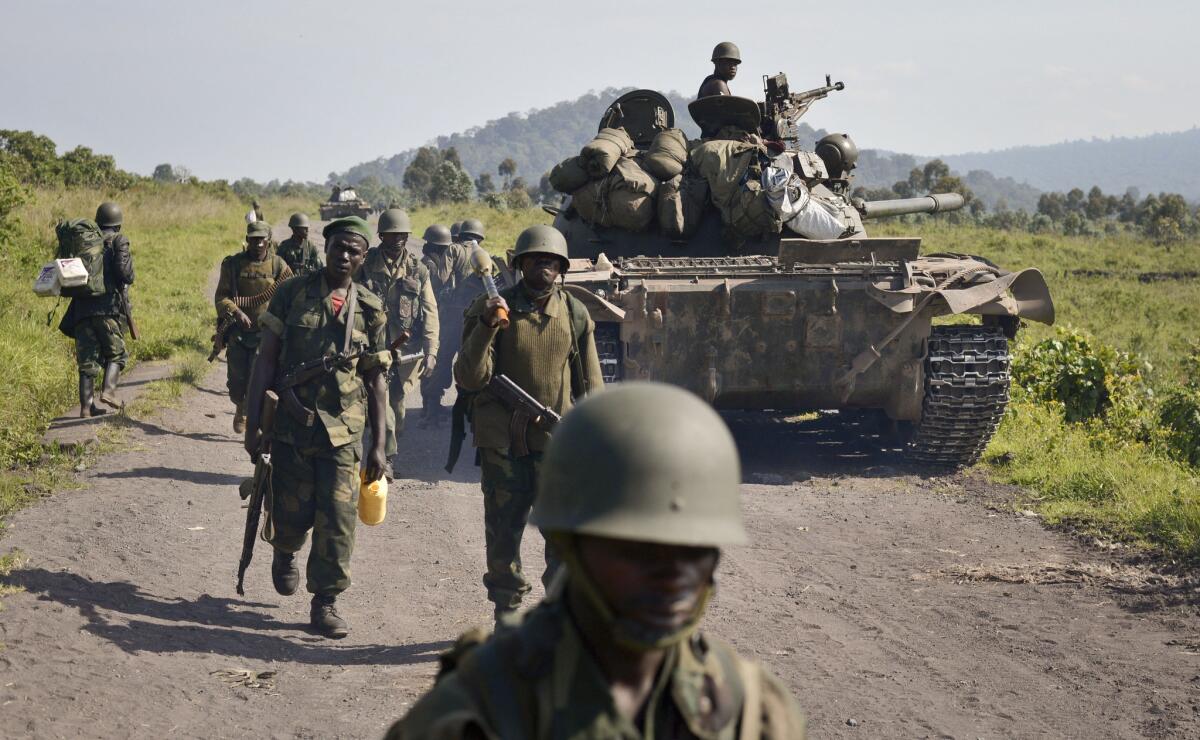Congolese peace deal encounters a hitch

- Share via
JOHANNESBURG, South Africa -- After 19 years of fighting in the eastern Democratic Republic of Congo, diplomats and envoys gathered for the signing of a deal to seal the defeat of the Congolese rebel group, M23.
But the Congolese government and M23 couldn’t even agree to get into the same room in Uganda late Monday. The deal, which appeared to offer the first glimmer of hope for peace in years, went unsigned.
The hitch? Whether the document was to be called an “agreement” or a “declaration.”
The agreement, understanding, deal or declaration was supposed to lay down the process for the disarming and demobilization of M23. Under its terms, lower-ranking soldiers were to be integrated into the Congolese army.
At the heart of the last-minute failure was the fact that M23 was recently defeated militarily. The Congolese argued that as a result, the former rebel group had no legal status.
“What are we supposed to sign? No country in history has signed an agreement with a movement that has declared its own dissolution,” Lambert Mende, spokesman for the Congolese government, told Reuters.
“It’s as if M23 still exists, it’s as if it is legitimating them despite them being a negative force,” he said.
Mende added that his government would only sign “a declaration of engagement between the government and former members of the rebel group known as M23.”
The setback underscores the continuing mistrust between the Democratic Republic of Congo and two of its eastern neighbors, Uganda and Rwanda, that could threaten the hopes of trying to convert a victory into a lasting peace.
M23’s defeat was an important moment -- the first time the Congolese army has managed to defeat a major rebel group. M23 last week announced it was disarming and disbanding as a rebel militia, but would continue to operate as a political force.
With some 1,500 rebel fighters and M23 officers sheltering in Uganda, the failure to sign a deal is likely to deepen the already tense relationship between Uganda and the Democratic Republic of Congo.
The Congolese delegation at the peace talks blamed Uganda for the failure to sign the deal, agencies reported, accusing it of favoring M23.
Congolese officials want Uganda to surrender M23 leaders, whom it accuses of crimes against humanity -- but that’s unlikely to happen without a peace deal.
Ugandan government spokesman Ofwono Opondo told reporters that the Congolese delegation refused to enter the room to sign the agreement, keeping envoys and diplomats from the U.N., the United States, Europe and the African Union waiting.
U.N. officials and analysts have warned that while the military defeat is significant, it must be accompanied by a peace deal.
Mende also accused Ugandan mediators of blocking a Congolese demand that M23 agree not to resume fighting again. “Uganda seems now to be acting as part of the conflict. It has interests in M23,” Mende said.
Analysts said Rwanda, which last month was sanctioned by the United States for supporting M23, appeared to play no role in the recent battles that saw M23 retreat, lose its grip on strategic towns and abruptly announce it was disbanding.
During its rebellion, M23 took a large swath of territory, briefly conquering the region’s largest city, Goma.
According to a U.N. group of experts that reported regularly on the conflict to the U.N. Security Council, Rwanda had armed, supported, led and fought alongside M23 in the Democratic Republic of Congo, an accusation Rwanda denies.
Analysts speculate that Rwanda’s halt to its long-term interference in the region may have come because of the intense international pressure on Rwandan President Paul Kagame to do so.
One reason for M23’s defeat was the restructuring of the Congolese army into a leaner, more efficient force, according to analysts, while a U.N. intervention brigade with robust powers to engage rebel forces was also crucial.
The next step to stabilize the eastern Democratic Republic of Congo is to eliminate other armed militias, in particular the FDLR, a militia that includes some of the Hutu extremists responsible for the 1994 genocide in Rwanda.
Many warn that unless Rwandan concerns in the eastern Democratic Republic of Congo are met, it may continue to try to interfere in the region in future, because it is seen as a vital sphere of interest.
The FDLR’s numbers and strength have dwindled but it still stages cross-border attacks against Rwanda. Rwanda is unlikely to cease its intervention in the eastern Democratic Republic of Congo unless the FDLR is defeated and its leaders prosecuted for crimes against humanity, according to analysts.
ALSO:
Aid workers struggle to reach Philippine typhoon victims
In Karachi, Pakistan, few families are untouched by crime
North Korea executes 80, some for minor offenses, newspaper says
Twitter: @latimesdixon
More to Read
Sign up for Essential California
The most important California stories and recommendations in your inbox every morning.
You may occasionally receive promotional content from the Los Angeles Times.













